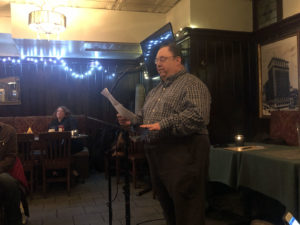 There is a photo that I’ve seen on Facebook a number of times of a sign of lyrics from Sir Mix-A-Lots classic “Baby Got Back” where the word butt is replaced by books. And while I do like some big books, which I would consider anything with more than 600 pages, I also am intimidated by the size sometimes. But I am going to try getting over my fear of them.
There is a photo that I’ve seen on Facebook a number of times of a sign of lyrics from Sir Mix-A-Lots classic “Baby Got Back” where the word butt is replaced by books. And while I do like some big books, which I would consider anything with more than 600 pages, I also am intimidated by the size sometimes. But I am going to try getting over my fear of them.
This all started when I was watching a Book Tube video of a British guy who calls himself Knowledge Lost. He said he was going to read Underworld by Don De Lillo (827 pages). I had a copy on my shelf and I always wanted to read it. I loved White Noise and Libra by De Lillo and thought this would be great time to finally tackle it.
The first 60 pages are about baseball, which takes place during the famous game where the NY Giants beat the Brooklyn Dodgers on October 3, 1951. Even though I am a son of a sports reporter, I never liked sports, so reading the opening chapter was a challenge. But I figured if I got through that, I could make it through the rest of the book.
The reason I’m intimidated by big books is that I can be a slow reader sometimes. If the plot is flying by at breakneck speed, I’m probably going fly through it. Still, the days where I can read a book in a day are gone unless it’s a small book. It took me a month and a half years ago to read Carson McCuller’s The Member of the Wedding, a mere 163 page novel. It might have been because I didn’t like it as much as her first book, The Heart is a Lonely Hunter (368 pages). Also, there are days when I come home from a hard day at work, and I just want to watch TV or play Words With Friends all night. Or waste the whole night watching YouTube videos.
It’s not like I haven’t read large books before. I’ve read two James Michener books when I was younger, Centennial (1,056 pg) and Chesapeake (a slimmer 1024 pages ). I also read Sarum by Edward Rutherford, England’s version of Mitchner. That book followed 5 families over centuries for all its 1,200 pages. I would have been happy if there were just 4 families.
I’m proudest though that a couple of years ago I read Bleak House by Charles Dickens and loved all 900 pages. Someone said that this book was Dickens’ masterpiece. It only took 2 and a half months to get to the end but the last third of the book goes by quickly. I also am proud that I read The Amazing Adventure of Kalivar and Clay by Michael Chabon (639 pages) in 2 weeks.
I think the secret to reading big books is take it chapter by chapter. It’s easier to say I’ve only have only 15 pages to finish this chapter than admit you have another 300 hundred pages to go. Also, with most big novels, there are going to be slow spots. Try to power through them.
Even though I am 600 pages into Underworld, I’m glad I’m reading it. It’s an epic take on the Cold War and the implications of that era. I am also getting less scared of taking on a huge book. I’m interested in one day reading City on Fire by Garth Risk Hallberg, a 911 page book about NYC in the 70’s. Meanwhile, I might read lots of short stories for the rest of the year when I’m done with Underworld.
Do any of you feel the same way about books over 600 pages? Let me know.






It took me four attempts to finish ‘Infinite Jest’, but being the subject matter was near and dear to me, I just had to complete it…though I have yet to make it through the entire Oxford unabridged dictionary…
I haven’t been brave enough to tackle that one.
When it’s a good book, the longer the better! Moby Dick at over 500 pages is my favorite of all.
I didn’t like Moby Dick but I had no problem reading Bleak House.
A good book will keep you moving forward, even through segments that seem to you less appealing. It is hard to tell, like your experience with Underworld, when you don’t necessarily relate to the beginning, that you will eventually be immersed, and forget while you are reading, that you are reading a Big Book.
Included among the big books I’ve read in my lifetime, Michener’s Hawaii, and Texas.
I read some of Michener’s books and liked them when I skip over the dinosaurs, lol.